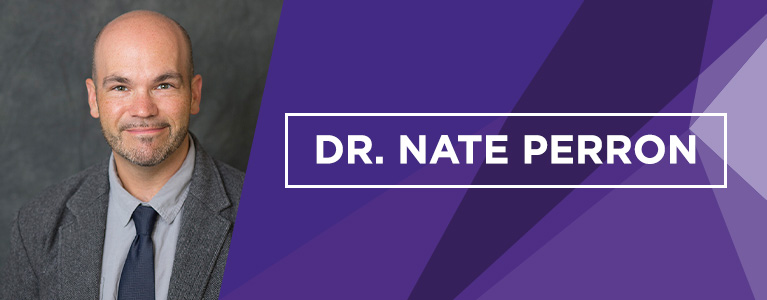Dr. Nate Perron Leads Training on How to Support the Mental Health for Law Enforcement

First responders and police officers face unique mental health challenges that are often overlooked. A report by the Ruderman Family Foundation found that more firefighters and police officers died by suicide than in the line of duty in 2017.
“In the old days, people just said ‘toughen up and you’ll be fine.’ Unfortunately, our suicide rates are showing that that’s not good enough,” said Dr. Nate Perron, a core faculty member with The Family Institute at Northwestern University’s online Master of Arts in Counseling program.
Dr. Perron recently participated in “Bridging the Gap,” a day-long training hosted by the Illinois Association of Chiefs of Police.
“The point was to really engage in conversation between law enforcement and mental health support to focus on what is going to be helpful,” he said.
The afternoon session he led for counselors and mental health professionals focused on how to support police officers and their families. He covered skills such as how to recognize different types of trauma reactions and how to support family members whose loved ones might be exhibiting increased stress. Dr. Perron said counselors should work with departments to provide tools for stress management, especially after potentially traumatic incidents.
“Our need to really process traumatic experiences is extremely important,” he explained. “Having crisis incident stress debriefings, and departments that really advocate for debriefing situations that occur—not only from a factual standpoint but also from an emotional standpoint—is really an important next step.
Dr. Perron considers the “Bridging the Gap” training a positive sign that law enforcement higher-ups are starting to take these issues more seriously. He said police departments operate under a strict organizational hierarchy and conversations about mental health need to “come from the top down.”
To learn more about mental health and how to help those who may be vulnerable to or experiencing a crisis, consider these resources:
- Breaking the Silence: Suicide Prevention in Law Enforcement: The Carson J Spencer Foundation, in partnership with the International Association of Chiefs of Police, National Action Alliance for Suicide Prevention, and the American Association of Suicidology features police officer testimonies in this video resource.
- Comprehensive Blueprint for Workplace Suicide Prevention: The National Action Alliance for Suicide Prevention provides suicide prevention resources for workplaces.
- Copline: Police and family members can call this confidential suicide hotline staffed 24/7 by retired law enforcement officers.
- Critical Incident Stress Management Debriefing Script (PDF, 186 KB): Crisis Care Response offers an outline for a stress management debriefing after a traumatic event.
- Law Enforcement Family Resources: This webpage from the International Association of Chiefs of Police provides resources for families to support law enforcement officers.
- Police Officer Toolkit: Understanding PTSD (PDF, 851 KB): The National Center for PTSD provides information on PTSD for law enforcement training.
- Preparing for the Unimaginable (PDF, 6.1 MB): The National Alliance on Mental Illness and the Justice Department’s Community Oriented Policing Services details “how chiefs can safeguard officer mental health before and after mass casualty events.”
- Psychological First Aid for First Responders: Tips for Emergency and Disaster Response Workers (PDF, 509 KB): This publication from the Substance Abuse and Mental Health Services Administration offers advice for dealing with traumatic incidents.
- The Five Steps: The organization #BeThe1To describes five steps to communicate with someone who may be suicidal.
- Veteran Outreach Toolkit: Preventing Veteran Suicide Is Everyone’s Business (PDF, 2.2 MB): The Department of Veterans Affairs outlines how communities can support suicide prevention.
Citation for this content: Northwestern University’s online Master of Arts in Counseling program.

